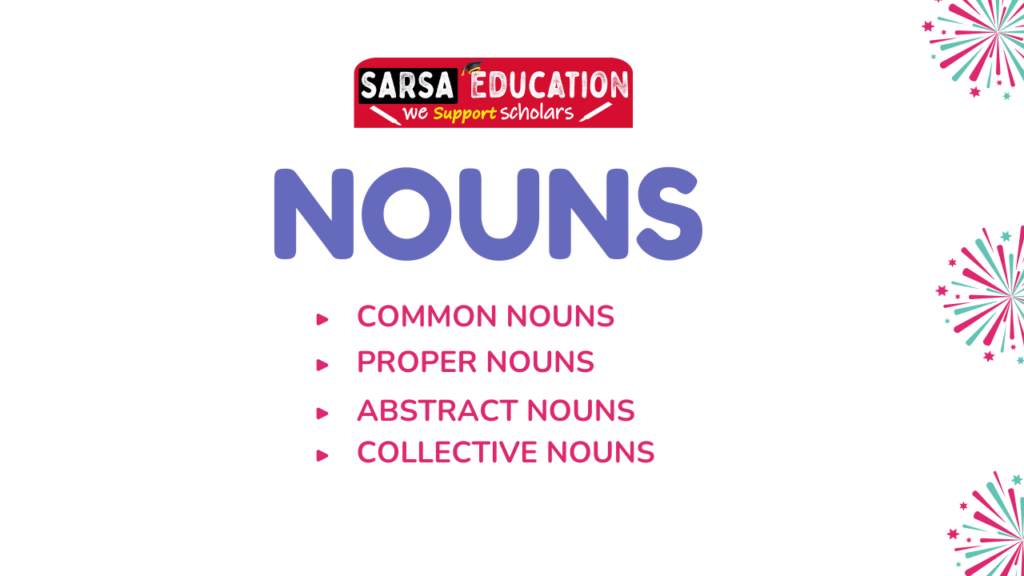Contents
Nouns
A noun is a word that names a person, place or thing.
Types of Nouns
- Common Noun
- Proper Noun
- Abstract Noun
- Collective Noun
- Countable Noun
- Uncountable Noun
- Compound Noun
- Possessive Noun
Common Noun
- A common noun names any person, place, or thing. Examples: teacher city dog etc.
- A common noun does not begin with a capital letter.
- A common noun does not name a particular person, place, or thing.
- Example: Boy, girl, cat, chair
- The boy made a boat.
- The brothers went to the park.
- A girl was with her grandmother.
- In above sentences boy, brothers, park , girl and grandmother all these indicate a caste, hence they are common nouns.
Proper Noun
- A proper noun names a particular person, place, or thing.
- Examples: Ms. Brown San Francisco Atlantic Ocean.
- A proper noun begins with a capital letter.
- Some proper nouns contain more than one word. Each important word begins with a capital letter. Examples: Statue of Liberty Boston Red Sox
- The name of a day, month, or holiday begins with a capital letter.
- Example:
- My cousin Karen is the best pitcher I know
- I like to play baseball with my brother.
- In these sentences Karen and baseball are proper noun, Karen is the cousin’s name and baseball is the game’s name.
List of Common nouns & Pronouns
Category Common Noun Proper Noun
People girl, teacher, artist Riya, Mr. John, Doremon
Places city, country, school Delhi, India, Vibgyor
Organizations company, team, brand Google, Cricket, Duke
Days/Months day, month, holiday Monday, January, Diwali
Books/Movies book, film Harry Potter, Titanic
Animals cat, dog, bird Felix, Lassie, Tweety
Events festival, war Olympics, World War II
Abstract Nouns
An abstract noun is the name of a quality, action or state which we cannot see or touch.
Quality: kindness, goodness, honesty, wisdom, bravery, politeness, truth
Action: laughter, hatred, movement, theft, judgement
State: childhood, boyhood, manhood, youth, slavery, freedom, sickness, poverty, death
The names of the arts and sciences (music, painting, chemistry, physics, etc.) are al abstract nouns.
Abstract nouns are formed:
- From adjectives:
- Goodness from good
- Bravery from brave
- Honesty from honest
2. From verbs:
- Obedience from obey
- Pleasure from please
- Punishment from punish
3. From common nouns:
- Childhood from child
- Slavery from slave
- Kingdom from king
Common Noun- Practice worksheet click here
Proper Noun- Practice worksheet click here
Collective Noun
When we refer to a collection of persons or things taken as a whole, we use a collective noun.
- A muster of peacocks
- A bunch of keys
- A gang of elks
- A crowd a collection of people
- A sloth of bears
- A fleet a collection of ships or aircraft
- A team of players
- A string of ponies
- A pod of dolphins
- A constellation of stars
- A flight of doves
- A board of directors
- A herd of cranes
- An army a collection of soldiers
- A colony of bats
- A fleet of cars
- A host of sparrows
- A string of pearls
- A nest of rabbits
- A chain of islands
- A clutch of eggs
- A host of angels
- A bundle of papers
- A pride of lions
- A troop of monkeys
Key Features of Collective Nouns:
- Singular Form: A collective noun is usually treated as singular, even though it refers to multiple members
Examples:
- The team is winning.
- The audience was captivated by the performance
- The family lives in a big house in the city.
- The flock is grazing in the meadow.
2. Plural Form: It can be treated as plural if focusing on individuals within the group.
Examples:
•The team are arguing among themselves.
•The audience are leaving their seats slowly.
(Refers to individual audience members.)
The family are sharing their opinions about dinner.
(Focus on individual family members.)
•The flock were scattered by the loud noise.
(Emphasis on individual birds or sheep.)
Read also: Day 1: Articles
Common Noun- Practice worksheet click here
Proper Noun- Practice worksheet click here
For regular English Speaking Course updates, kindly join our Telegram channel
Follow the Sarsa Education channel on Telegram: https://shorturl.at/R5WKa

